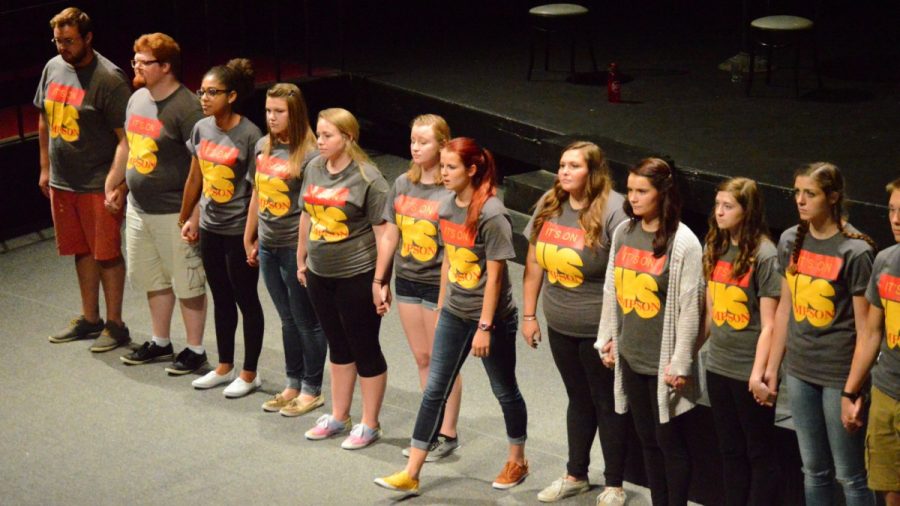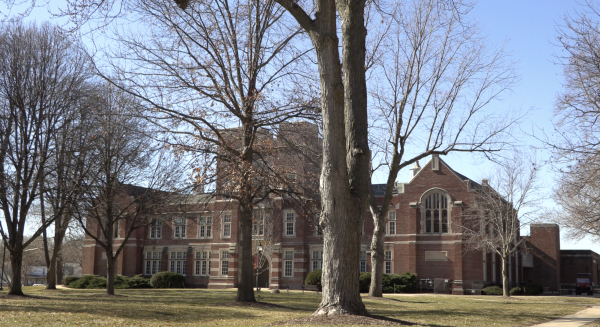Joe Biden makes final push to end sexual assault on campuses
January 5, 2017
DES MOINES, Iowa — With just two weeks left in office, Vice President Joe Biden is urging college presidents to fight against sexual assault on college campuses.
In a letter released Thursday, Biden called for university administrators to “step up” and end sexual assault – the same day the White House released its final “It’s On Us” summit, an event focused on curbing sexual violence against students. It’s also the same day the White House released a final report on student sexual assault and a guide for university presidents, chancellors and senior administrators.
The initiative has three main components:
– Consent education
– Increasing bystander intervention
– Creating an environment that supports survivors
Biden called for a change in culture on how campuses approach the protection of students and supporting survivors, as well as stressing that sexual violence should not be tolerated.
“It’s about creating an environment where all students are treated with dignity and respect; where men and women feel empowered to step up and speak out against sexual violence; and where survivors of sexual assault no longer feel ashamed to come forward and ask for the help they desperately want and deserve,” Biden wrote.
The Obama administration’s strongest stance on the issue came about in 2011 when it enforced Title IX to cover sexual violence on campus, which has prompted an increase of sexual assault investigations by the Education Department’s Office for Civil Rights, the Chronicle of Higher Education reports.
It is unclear what the Trump administration plans to do concerning Title IX enforcement.
Biden called for special attention to areas where sexual assault has been prevalent at many institutions of higher education, notably athletics and Greek life.
READ BIDEN’S FULL LETTER HERE:
“Every fall, thousands of parents drop their children off at your colleges with enormous hope and expectation. But deep in the pit of every parent’s stomach is a nagging fear — will my child be alright?
“That’s a tough thing to have to fear, but they’ve seen the statistics and they’ve read the headlines:
“A first-year student goes to a party, drinks some beer, passes out, and wakes up in a strange dorm room to find a classmate she barely knows sexually assaulting her.
“Three men after a football game sexually assault a student, and videos of it are posted on social media.
“A student at a military-service academy is the victim of sexually humiliating hazing rituals at the hands of his peers.
“Lesbian, gay, bisexual, transgender, and queer students are harassed and threatened with sexual violence by anonymous posters on social-media platforms like Yik Yak.
“As leaders of our nation’s colleges and universities, you have a legal and a moral obligation to combat sexual violence on your campuses — and that starts with changing the culture on your campuses.
“I know it’s not easy. From the first hearing to the final vote and a president’s signature, it took me many years to get the Violence Against Women enacted into law, in 1994. Back when domestic violence was considered a family affair. Back when critics of battered-women shelters called them ‘indoctrination centers.’ Back when victims of sexual assault were revictimized by a legal system and a society that asked the wrong questions about what the victim did or what she was wearing, instead of asking why the perpetrator felt he could do what he did.
“But over the past 20 years, we have made substantial progress toward protecting victims and changing attitudes in this country. Domestic-violence rates have dropped 72 percent over the last 20 years — with an even higher percentage of victims reporting their abuse to authorities. Rape-crisis centers and sexual-assault forensic examiners are now in nearly every major city in America.
“But have we made sufficient progress to protect students and change attitudes on your campuses?
“Twenty-two years ago, approximately one in every five women in college experienced rape or sexual assault. Today, the number is the same. And for female transgender and bisexual students, it’s even worse: one in four transgender students experience sexual assault in college. For bisexual students, it’s one in three.
“These numbers are unacceptable, and it’s on all of us to make it stop. I’ve been all around the country — from Syracuse to UNLV, to the Naval Academy, Clemson, Morehouse, and more — meeting with thousands of students, including members of fraternities, sororities, sports teams, and clubs who are working to get men involved.
“I’ve joined celebrities like Lady Gaga, and student survivors across the country who have shared their stories of abuse to make sure it doesn’t happen to anyone else. Bystanders are stepping in to stop the violence. Advocacy groups, students, academic and professional associations, campus-safety officers, faculty, and administrators are reimagining a world where a person’s right to be free from violence is a core principle of our culture and values.
“Many of you are answering the call — sending open letters to your students about your schools’ policies and procedures on sexual assault. Educating students on bystander intervention. Holding campuswide listening sessions. Meeting face to face with survivors. Administering campus-climate surveys to assess the true nature and extent of sexual violence on your campuses.
“But we haven’t seen enough of you. As presidents, chancellors, deans, and administrators, you have an obligation to stand up, to speak out, to foster the safest and most inclusive environment possible for every student that walks onto your campuses.
“So I’m asking you to approach sexual violence with the same seriousness and resources as you would any other epidemic. Change depends on your leadership.
“I asked my White House Task Force to Protect Students from Sexual Assault to prepare a guide specifically to help you develop your plans for addressing sexual assault on campus. You can read it here. It suggests important steps, like:
“Sending a clear message to students, faculty, administrators, coaches, and campus-safety personnel that sexual misconduct will not be tolerated and survivors must be supported.
“Conducting a campus-climate survey to understand the scope of the problem on your campus.
“Training all students — during orientation and via ‘booster shots’ throughout their college education — about consent, relationship violence, sexual misconduct, stalking, and bystander intervention, where to find resources for help, and where to file complaints. Special attention should be paid to certain areas, such as athletics and Greek life, which have historically been sites of sexual violence at many institutions of higher education.
“At the end of the day, it’s about creating an environment where all students are treated with dignity and respect; where men and women feel empowered to step up and speak out against sexual violence; and where survivors of sexual assault no longer feel ashamed to come forward and ask for the help they desperately want and deserve.
“Your actions matter. Your leadership matters.
“This is much more than just a campus problem. But by demonstrating your commitment to end this scourge, your actions can reverberate across the country, and around the world.
“Everyone has a responsibility — as the leaders, it starts and ends with you.
“Resources and information on these efforts can be found at www.NotAlone.gov and www.ItsOnUs.org.”

















